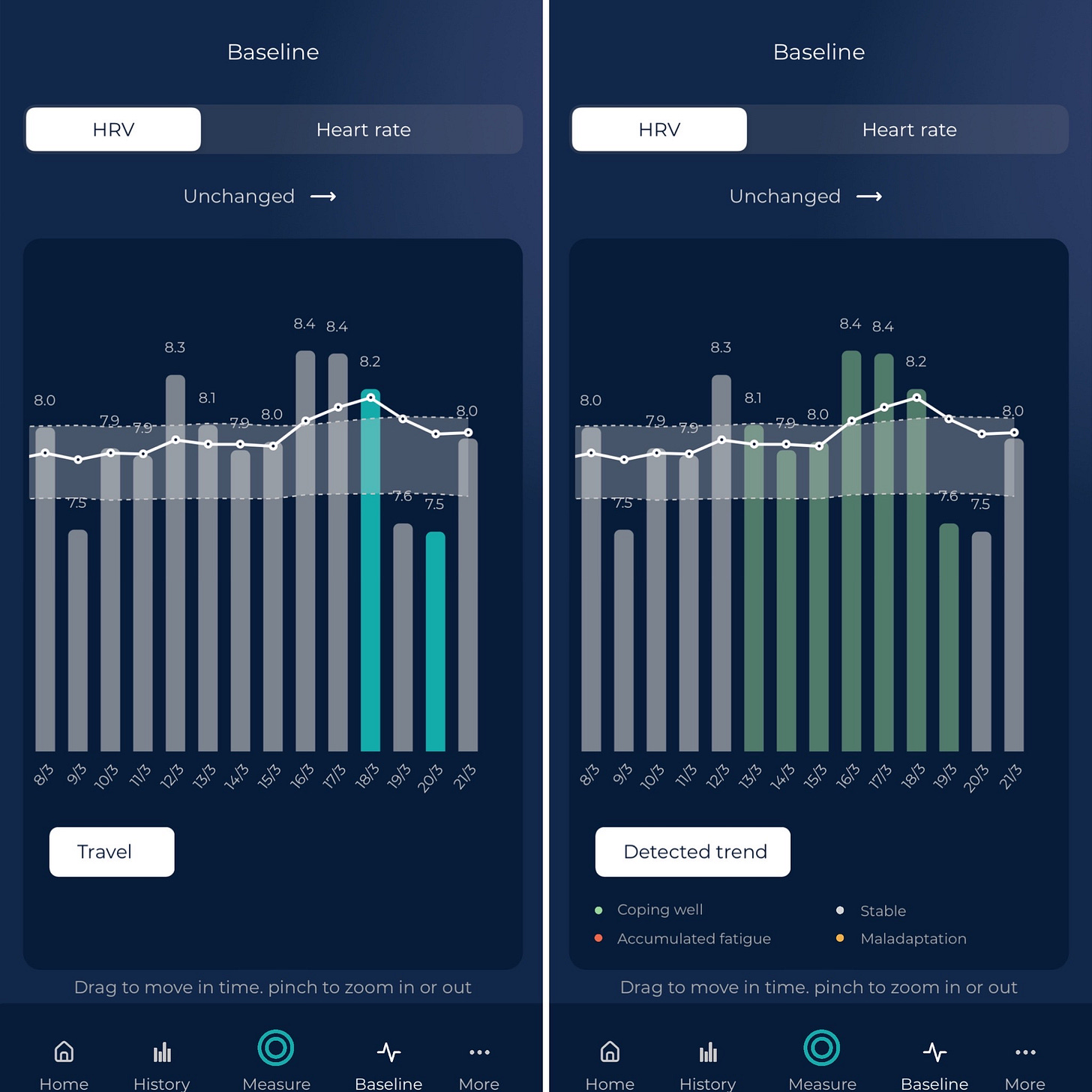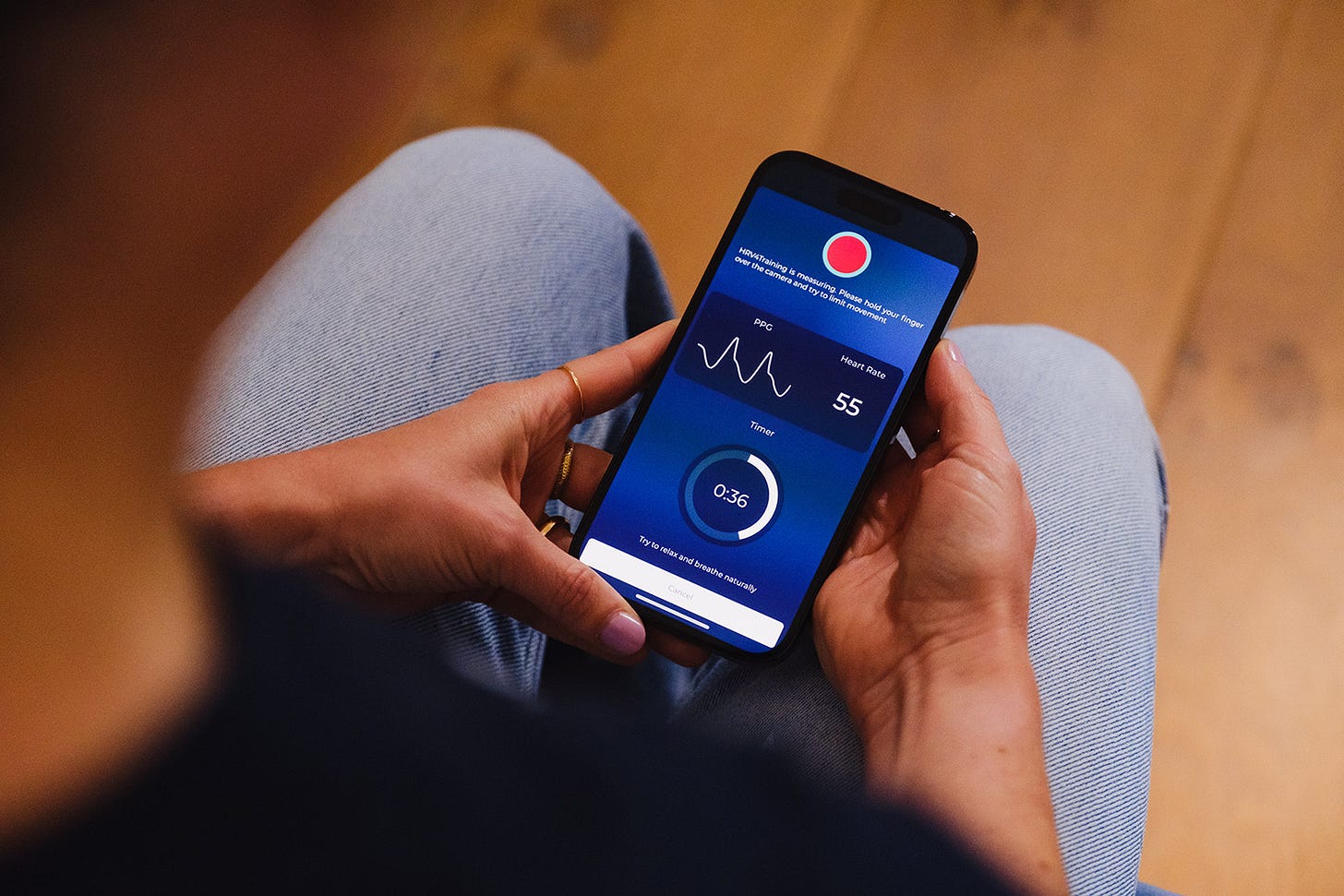Week 50: Higher HRV: Is It Always Better?
A rhetorical question
hi there 👋
I hope everything is well.
Recently, I had the pleasure of exchanging thoughts with Fuminori Takayama, a coach, scientist, and HRV4Training ambassador from Japan, about a study investigating the effects of wearing magnetic garments during sleep on recovery and HRV after a hard workout (30 km run).
The study - which you can find here - claims that these garments improve recovery, as HRV was reported higher when using them, together with increased deep sleep. However, as is often the case with HRV research, the reality might not be as straightforward as the conclusions suggest. Below I report some of the considerations of my exchange with Fuminori.
Interpreting Changes in HRV
HRV is often viewed as a marker of recovery, with the simplistic notion that ‘higher is better’. While this may hold at the population level or for general trends, individual acute responses to interventions or stressors often tell a different story. In this study, the authors report a significant increase in HRV (rMSSD) in the intervention group, doubling from pre- to post-run sleep. At first glance, this might seem like a fantastic result, signaling enhanced recovery. But does it?
Fuminori pointed out a key observation: the control group showed no significant change in HRV, which suggests their recovery was already adequate without the intervention. As I’ve discussed plenty of times (e.g. here), an ideal physiological response, is stability, i.e. re-normalization within a few hours (e.g. before the next morning measurement). Given the high level of the athletes involved, we could expect their HRV to bounce back to normal within a few hours. In contrast, the intervention group exhibited an extraordinary HRV increase. But rather than interpreting this as unequivocally positive, we should question whether such a large change reflects true recovery or something else - maybe even an issue.
Large increases in HRV, especially immediately following intense exertion, can sometimes indicate overactivation of the parasympathetic nervous system or even arrhythmias. Without additional data, such as resting heart rate or individual pre- and post-intervention responses, subjective feel, and maybe even the raw data to actually analyze the potential for cardiac abnormalities, it’s impossible to determine whether these changes are genuinely beneficial or a sign of dysregulation or else. (in this blog I show an example of HRV data after a bike accident, which resulted in a high increase in parasympathetic activity, as the body is not ‘very recovered’ but ‘very busy recovering’).
The Challenges of Wearables and Sleep Metrics
HRV aside, the study also reports improvements in deep sleep. However, data was collected with Fitbit devices, which estimate sleep stages from HRV data. While wearables have improved significantly in recent years, their accuracy in classifying sleep stages remains questionable, and in this case, specifically, it is really tricky to claim that there are changes in sleep architecture when the predictor (HRV) has been impacted this much. Has sleep really changed? This reliance on secondary, estimated, metrics introduces another layer of uncertainty, making it difficult to draw robust conclusions (let’s stick to measurements instead, shall we?).
Keep in mind that wearables optimized for general activity tracking or sleep monitoring may introduce inaccuracies when used for recovery studies. This is why I always advocate for tools and methodologies that prioritize accuracy, e.g. providing raw data or at least beat-to-beat data (e.g. an ECG or a chest strap or a camera app that displays the PPG signal and provides an assessment of data quality), as well as for protocols where measurements are taken intentionally, according to best practices. Wearables are good tools when everything is normal, but as soon as there is an abnormality (e.g. a particularly high HRV) we simply have no idea (and no way to investigate) where the issue comes from. Was it a data quality issue? Was it an actual cardiac issue or arrhythmia?
When I had frequent premature ventricular contractions, a few years ago, I was hardly able to measure in the morning with HRV4Training, as the app reported poor signal quality, due to the erratic nature of my heart rhythm. On the contrary, the wearable I was wearing at night would provide me with spectacular (as in quite high) HRV data (and associated recommendations!). I’ll let you guess which one of the two tools can be trusted, and which one should not be trusted (I will add that when a tool does not provide you with information about signal quality, it’s a huge red flag, because there is absolutely no doubt the data cannot always be of high quality, and this information must be reported to the user).
Wrap up
Recovery is complex, involving physiological, psychological, and contextual factors. HRV is a valuable tool, but its interpretation requires nuance. A higher HRV isn’t always synonymous with better recovery, just as a lower HRV isn’t always bad. The context (training load, baseline variability, and other physiological metrics like resting heart rate, as well as subjective feel) matters when interpreting the data.
Special thanks to Fuminori for his thoughtful insights and dedication to advancing the science and application of HRV in sports.
Other recent articles
Trusting the Right Tool for the Job - I’ve updated this blog with more considerations and additional data from wearables showing how they are getting worse - not better - at measuring HRV (e.g. Fitbit, Garmin, the Apple Watch). Maybe it’s time to switch to morning measurements.
TrainingTalk: Macro and Micro-Periodization, Health, Performance, and more. I wrote about changing my periodization about a year and a half ago (here), with the goal of staying healthier while still trying to push my limits. Since enough time has passed, in this blog I’ll assess how that went, and discuss a few additional changes I am going to implement in the next months, motivated by my past year’s health and performance.
Discount for Pro: 20% off 🖥️
HRV4Training Pro is the ultimate platform to help you analyze and interpret your physiological data, for individuals and teams.
You can find a guide here.
Try HRV4Training Pro for free at HRVTraining.web.app or use promo code SCIENCE for 20% off.
In the app, Pro brings the normal values view, which can help contextualizing longer-term changes, as well as rMSSD on the homepage, see an example below:

See you next week!
Marco holds a PhD cum laude in applied machine learning, a M.Sc. cum laude in computer science engineering, and a M.Sc. cum laude in human movement sciences and high-performance coaching.
He has published more than 50 papers and patents at the intersection between physiology, health, technology, and human performance.
He is co-founder of HRV4Training, advisor at Oura, guest lecturer at VU Amsterdam, and editor for IEEE Pervasive Computing Magazine. He loves running.
Social:





Hey Marco! Curious about your thoughts on a high baseline HRV. Over the summer my morning readings were pretty consistently around 120-130ish on HRV4T. It tanked for a few weeks after a concussion I got in mid October (down to 40-60 with random high spikes up into the 200s), then steadily climbed as I recovered, and for the last couple months my readings have been pretty steady around 220ish.
Only difference from the summer is that I’m able to exercise a lot more consistently (but not *that* much, maybe 7-10 hours/wk), and my sleep is generally better, but I’m also working a ton more too, so…?
I didn’t realize readings over 200 were “so high” but I’ve been sharing online a bit about my concussion rehab protocols and have had lots of people very surprised that my morning HRV is “so high.” I’m guessing it’s likely just genetic and it’s fine and normal for me, but perhaps it’s actually potentially pathological? 🤔 Any thoughts on that? My resting HR is usually in the mid to high 40s.
My Garmin watch tells me I’m around 50-70 for my overnight HRV readings, but I don’t put much stock in that — just an interesting data point.
I’ve had serious doubts about my Apple Watch and its data. It’s so much different than the Fitbit I used to use. Fitbit told me I was sleeping deeper, had better HRV, and was in better cardio shape. Apple tells me I suck across the board. So I’ve stopped measuring. I find it hard to believe that I can run for a full hour three times a week and be considered below average for cardiovascular fitness. But that’s the determination of my Apple Watch.